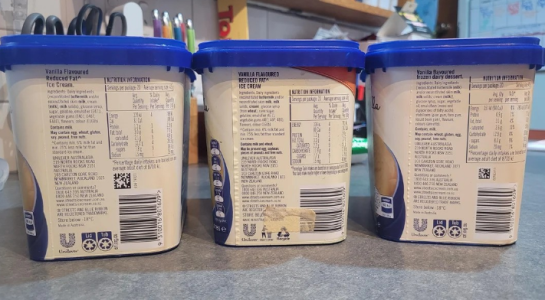This beloved treat has changed—did you notice?
By
Gian T
- Replies 0
In Australia, where the sun scorches and the beaches call, there's nothing quite like the sweet reprieve of a cold, creamy ice cream.
It's a treat that's woven into the fabric of our Australian lifestyle, a simple pleasure that cools us down and lifts our spirits.
However, what happens when a beloved brand quietly changes the recipe of this iconic summer staple?
One household name that has chilled Australian freezers for generations has recently made a change that's left many consumers feeling frosty towards the brand.
The alteration might seem minor at first glance, but it's indicative of a significant shift in ingredients that has some Aussies abandoning the brand for other options.
The scoop on the change came to light when an eagle-eyed ice cream aficionado shared their discovery online. Accompanied by a photo, the post highlighted a series of changes in Streets Ice Cream’s ingredients list, including variations in sugar and fat content.
The most noticeable change was the product's name, which had been subtly switched from 'Vanilla Flavoured Reduced Fat Ice Cream' to 'Vanilla Flavoured Frozen Dairy Dessert'.
Labelled as 'The decline of Streets,' the post lamented the change, pointing out that not only could the product no longer be called ice cream, but it also contained higher levels of saturated fat.
The reaction from the community was swift and chilly, with many commenters expressing their disappointment and vowing to never purchase the product again.
One person remarked, 'Yep I’ve STOPPED buying this since it changed,' while another shared, 'Well that explains why the last tub I bought wasn’t as good as I remembered.'
The sentiment was echoed by others who felt betrayed by the change, with one stating, 'I accidentally grabbed some because the store was out of Bulla, and it is like very airy cream? Tragedy.'
The conversation soon revealed that this wasn't an isolated incident. Other consumers noted that the term 'frozen dessert' has become depressingly common.
'Frozen dessert to me means, we’ve lowered our standards so much and there is no term to describe this monstrosity we’ve created,’ one commenter said. ‘So frozen dessert is a catch-all to describe stuff you should never buy.'
The term 'frozen dessert' typically implies that the product is made with vegetable oil instead of traditional milk or dairy products. This substitution often results in a different texture and taste, which can be a letdown for those expecting the rich, creamy experience of genuine ice cream.
The debate even extended to suggestions about supermarket practices, with one person opining, 'The supermarkets should have to place them in a separate “frozen dessert” section with a sign explaining the lack of milk fat.'
As the community churns with discontent, it's clear that the essence of what makes ice cream so beloved is at stake.
The shift towards 'frozen desserts' is not just about semantics; it's about the integrity of a product and the trust between a brand and its customers.
At the time of writing, the company had not responded. Meanwhile, it's important for consumers to remain vigilant and informed about the products they purchase.
After all, in the heat of the Aussie sun, we deserve nothing less than the best scoop.
 So, dear readers, have you noticed this change in your favourite ice cream? Have you found alternatives that still deliver the creamy goodness you crave? Share your thoughts and experiences in the comments below, and let's keep the conversation going about the treats that make our summers so sweet.
So, dear readers, have you noticed this change in your favourite ice cream? Have you found alternatives that still deliver the creamy goodness you crave? Share your thoughts and experiences in the comments below, and let's keep the conversation going about the treats that make our summers so sweet.
It's a treat that's woven into the fabric of our Australian lifestyle, a simple pleasure that cools us down and lifts our spirits.
However, what happens when a beloved brand quietly changes the recipe of this iconic summer staple?
One household name that has chilled Australian freezers for generations has recently made a change that's left many consumers feeling frosty towards the brand.
The alteration might seem minor at first glance, but it's indicative of a significant shift in ingredients that has some Aussies abandoning the brand for other options.
The scoop on the change came to light when an eagle-eyed ice cream aficionado shared their discovery online. Accompanied by a photo, the post highlighted a series of changes in Streets Ice Cream’s ingredients list, including variations in sugar and fat content.
The most noticeable change was the product's name, which had been subtly switched from 'Vanilla Flavoured Reduced Fat Ice Cream' to 'Vanilla Flavoured Frozen Dairy Dessert'.
Labelled as 'The decline of Streets,' the post lamented the change, pointing out that not only could the product no longer be called ice cream, but it also contained higher levels of saturated fat.
The reaction from the community was swift and chilly, with many commenters expressing their disappointment and vowing to never purchase the product again.
One person remarked, 'Yep I’ve STOPPED buying this since it changed,' while another shared, 'Well that explains why the last tub I bought wasn’t as good as I remembered.'
The sentiment was echoed by others who felt betrayed by the change, with one stating, 'I accidentally grabbed some because the store was out of Bulla, and it is like very airy cream? Tragedy.'
The conversation soon revealed that this wasn't an isolated incident. Other consumers noted that the term 'frozen dessert' has become depressingly common.
'Frozen dessert to me means, we’ve lowered our standards so much and there is no term to describe this monstrosity we’ve created,’ one commenter said. ‘So frozen dessert is a catch-all to describe stuff you should never buy.'
The term 'frozen dessert' typically implies that the product is made with vegetable oil instead of traditional milk or dairy products. This substitution often results in a different texture and taste, which can be a letdown for those expecting the rich, creamy experience of genuine ice cream.
The debate even extended to suggestions about supermarket practices, with one person opining, 'The supermarkets should have to place them in a separate “frozen dessert” section with a sign explaining the lack of milk fat.'
As the community churns with discontent, it's clear that the essence of what makes ice cream so beloved is at stake.
The shift towards 'frozen desserts' is not just about semantics; it's about the integrity of a product and the trust between a brand and its customers.
At the time of writing, the company had not responded. Meanwhile, it's important for consumers to remain vigilant and informed about the products they purchase.
After all, in the heat of the Aussie sun, we deserve nothing less than the best scoop.
Key Takeaways
- A household ice cream brand in Australia has changed its recipe, leading to customer dissatisfaction.
- The product's name was subtly altered from 'Vanilla Flavoured Reduced Fat Ice Cream' to 'Vanilla Flavoured Frozen Dairy Dessert', indicating a change in ingredients.
- Consumers have noticed the difference, with some stating they will stop buying the product due to the decline in quality and change in taste and texture.
- The term 'frozen dessert' suggests a product made with vegetable oil instead of traditional milk or dairy products, affecting the expected creamy ice cream experience.








